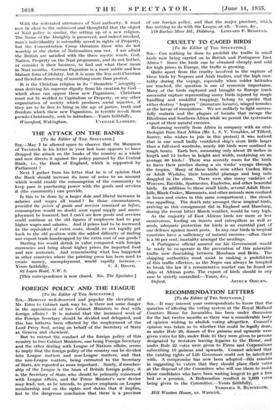CRUELTY TO CAGED BIRDS
[To the Editor of THE SPECTATOR.]
SIR,—Can nothing be done to prohibit the traffic in small birds now being carried on in British and Portuguese East Africa ? Since the birds can be obtained cheaply and sold for high prices in Europe, the traffic is growing.
Quite apart from the cruelty involved in the capture of these birds by Negroes and Arab traders, and the high mor- tality during the voyage, especially when colder latitudes are reached, the question is one of economic importance. Many of the birds captured and brought to Europe (each successful capture representing many birds injured by rough handling and unskilful trapping) belong to species that either destroy " hoppers " (immature locusts), winged termites or the larvae of mosquitoes. We are unlikely to fight success- fully malaria and the plagues of locusts that ravage the Rhodesias and Southern Africa while we permit the systematic export of their natural enemies.
Returning recently from Africa in company with an orni- thologist from East Africa (Mr. L. S. V. Venables, of Tilford, Surrey, who wishes to join in this protest) it was noticed that in one small badly ventilated ship's store little larger than a full-sized wardrobe, nearly 500 birds were confined in rough boxes. Each box, measuring only about 29 inches in length and 15 inches in height and width, containing on an average 80 birds.! There was scarcely room for the birds to leave their perches during a six weeks' voyage through the tropics. Many of these birds were either Cordon Bleu or Adult Wydahs, their beautiful plumage and long tails draggled in the slime. There were also many varieties of Weavers, Estrilda, Spermestes, Euplectes, and other beautiful birds. In addition to these small birds, several Adult Horn- bills, Black Crakes, Marmosets, and other animals were confined in boxes and crates in this same compartment ; the stench was appalling. The death rate amongst these tropical birds, arriving as this consignment did in England and Hamburg, during the recent bitter March weather, would be very high.
As the majority of East African birds are more or less omnivorous, feeding on insects and caterpillars as well as seeds, adequate protection for birds is an essential part of our defence against insect pests. In any case birds in tropical countries have a sufficiency of natural enemies—often there is a 90 per cent. mortality amongst the nestlings.
A Portuguese official assured me his Government would be ready to co-operate in the prevention of this miserable traffic now flourishing between Mombasa and Beira. The shipping authorities must assist in making a prohibition of this traffic effective, as the Negro can always be tempted to break the law if a remunerative market can be found on ships at African ports. The export of birds should in any case be strictly controlled.—Yours, &c.,


















































 Previous page
Previous page